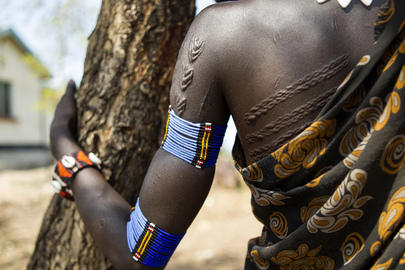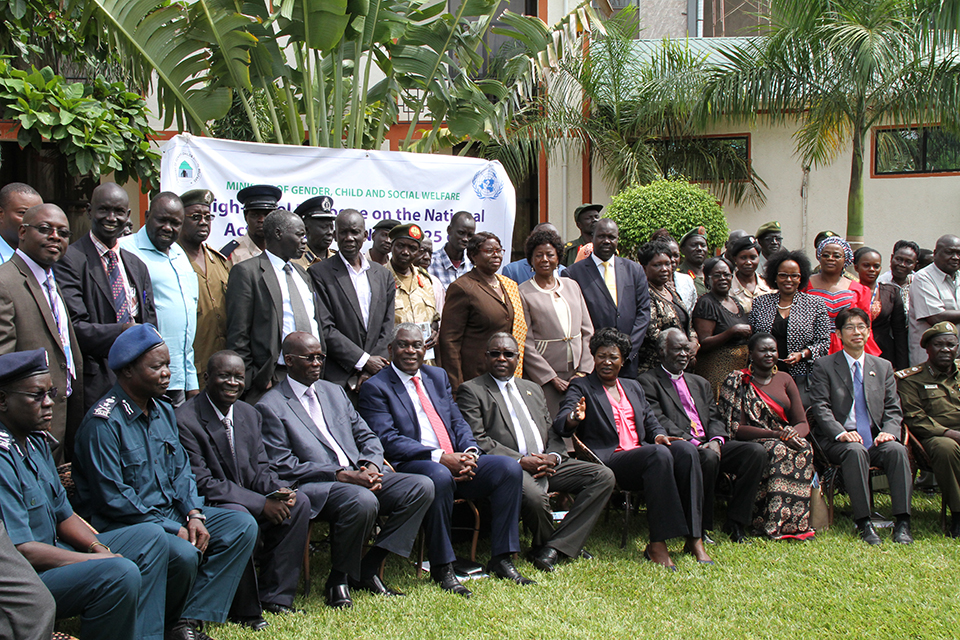Martine Perret/UN
By
Peter Louis
The Ministry of Gender, Child and Social Welfare, in partnership with the United Nations, held a two-day high-level dialogue to discuss the National Action Plan on Women, Peace and Security. The dialogue featured national leaders from government, military, law enforcement, civil society, and the United Nations speaking on the theme, “Addressing Impunity on Sexual and Gender Based Violence in South Sudan.”
The dialogue was opened on 27 September with remarks by Minister of Cabinet Affairs Hon. Dr. Martin Elia Lomoro; Minister of Gender, Child and Social Welfare Hon. Awut Deng Acuil; Undersecretary of the Ministry of Gender, Child and Social Welfare Hon. Esther Ikere Eluzai; and Deputy Special Representative of the Secretary General in South Sudan, UN Resident and Humanitarian Coordinator and UNDP Resident Representative Eugene Owusu.
“In the July crisis, we see that the culture of impunity remains a significant obstacle for responding to and addressing SGBV,” said Minister of Cabinet Affairs Dr. Martin Elia Lomoro. “The military, police, prisons, wildlife, national security and fire brigade have an oversight role to play and they have the responsibility to protect our people. SGBV is a crime, as defined by our constitution and our laws. The Bill of Rights of this country must be respected.”
“The responsibility to prevent these cases rests with the South Sudanese. It is our responsibility to reach our villages to spread the word and protect the people, and this can only be possible if we stop this unnecessary war and focus on the development needed to reach the most vulnerable populations to address SGBV,” continued Hon. Dr. Lomoro in his opening remarks.
“It is a well-known fact that women, children and other vulnerable groups suffer the most during conflict, and even more so when the conflict becomes protracted. The experience in South Sudan has been no different. Advancing women’s rights, and the common values of our shared humanity, is not something that we should start to address once peace fully prevails,” said Deputy Special Representative of the United Nations Secretary General, UN Resident and Humanitarian Coordinator, and UNDP Resident Representative Eugene Owusu. “Unless we actively promote and pursue the rights of women, and indeed that of all citizens, there will be no lasting peace — no lasting peace in our hearts, and no lasting peace in our communities.”
“Sustained implementation of the National Action Plan will be critical, and this will take a lot of hard work, dedication and commitment. I can promise you that your good-faith efforts will be supported by the United Nations,” concluded Mr. Owusu.
Against the backdrop of the July 2016 conflict in Juba, the Ministry of Gender, Child and Social Welfare intends to strengthen the implementation of the South Sudan National Action Plan 2015-2020 on United Nations Security Council Resolution 1325 on Women, Peace and Security and Related Resolutions. One of the immediate effects of the conflict is the increase in reported cases of conflict-related sexual violence (CRSV) against women and children.
“Efforts are being undertaken to prevent, protect and respond to SGBV,” said Minister of Gender, Child and Social Welfare Hon. Awut Deng Acuil. “The establishment and review of police special protection units are positive steps. The establishment of a Gender Department at the Ministry of Interior and the Department of Women and Juveniles at the Ministry of Justice is progress. But more efforts are needed. We still need specialized training for lawyers, prosecutors, traditional authorities and customary courts. Medical personnel have not received adequate training and hospitals are not appropriately equipped to treat survivors of SGBV.”
Panels on the first day of the high-level dialogue included an overview of the state of sexual violence during the conflict in South Sudan, and discussions on implementation of the National Action Plan on UNSCR 1325 into police, military and prisons policy. The second full day of panels focused on justice and reconciliation for sexual violence survivors, including coordination, response, and community and psychosocial support for survivors of SGBV. The dialogue featured national and regional specialists, including representatives from Kenya and Uganda to share their perspectives.
“All stakeholders must do their part in putting an end to gender-based violence in the South Sudan conflict,” said UNFPA Country Representative Esperance Fundira on a panel discussion on the National Action Plan. “A sustainable peace can only be achieved if there is meaningful equality and security for women, including access to reproductive health care and the eradication of gender-based violence.”
The United Nations Development Programme, United Nations Population Fund and UN Women co-organized the dialogue with the Ministry of Gender, Child and Social Welfare, supported by the United Nations Mission in South Sudan. Representatives from the international donor community were also in attendance, including ambassadors and representatives from the European Union, Germany, Sweden, Japan, United Kingdom and the United States.




No Comments Yet!
You can be first to comment this post!